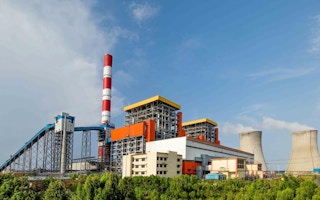A Singaporean energy firm may have committed “carbon footprint arbitrage” by selling off a coal firm to ostensibly reduce its greenhouse gas emissions while effectively retaining financial control of the company, according to a climate finance watchdog.
To continue reading, subscribe to Eco‑Business.
There's something for everyone. We offer a range of subscription plans.
- Access our stories and receive our Insights Weekly newsletter with the free EB Member plan.
- Unlock unlimited access to our content and archive with EB Circle.
- Publish your content with EB Premium.
Sembcorp Industries announced the sale of 2.6-gigawatt coal giant Sembcorp Energy India Limited (SEIL) to Omani private consortium Tanweer Infrastructure in September. In a press release, it said the deal “accelerates the transformation of Sembcorp’s portfolio from brown to green” and helps the company hit a 2025 target for slashing emissions intensity ahead of time.
Sembcorp is majority-owned by Singapore state investor Temasek, which is aiming to halve the emissions of its portfolio companies by 2030, and achieve net-zero emissions by 2050. Sembcorp is similarly aiming to cut its emissions in half by the end of this decade and reach net-zero by mid-century. Its sustainable solutions portfolio is expected to make up 70 per cent of its profits by 2025.
But Sembcorp’s sale of SEIL should not count as a real reduction in emissions and a win for the decarbonisation of the company, Stockholm-based watchdog Anthropocene Fixed Income Institute (AFII) has argued.
While Sembcorp says that the transaction allows it to immediately shrink its coal assets and hence reduce its carbon footprint, the transaction will be funded by Sembcorp through a deferred payment due in 15 to 24 years, such that Sembcorp will retain influence over SEIL, the watchdog noted. The deal means that “a physical asset simply shifts to become a financial asset on the balance sheet,” AFII said.
“
Sembcorp is simply shifting operational emissions into financed emissions through the transaction structure, with minimal real emissions reductions.
Anthropocene Fixed Income Institute
Sembcorp’s sale of its Indian coal power business merely “shifts operational to financial carbon exposure”, AFII said in a post on Monday.
SEIL’s carbon footprint should not be deducted from Sembcorp’s footprint until full payment for the transaction has been made (by 2038 or 2047), or it should be pro-rated as partial payments come through, the group said.
When contacted, a Sembcorp spokesperson told Eco-Business that its commitments to stakeholders, including bondholders, “are very clear and are not subject to interpretation”.
“Every step we take advances us towards the transition of our portfolio, underscoring our conviction to meeting our commitments,” said the company, reiterating the emissions reductions that this deal represents.
Sembcorp’s sale of its Indian coal business, and claims made around the sale, provide lessons for investors and shareholders looking to vote for or against the transaction at the company’s external general meeting, being held today, 8 November, AFII said.
Sembcorp says the deal will effectively reduce its absolute emissions from 26.2 million tonnes of carbon dioxide equivalent (tCO2e) to 10.4 million tCO2e, and its emissions intensity to 0.40 tonnes of carbon dioxide equivalent per megawatt hour (tCO2e/MWh) from 0.54tCO2e/MWh in 2020.
The success of this deal will also mean that more than half (51 per cent) of Sembcorp’s energy capacity will come from renewable energy, up from 43 per cent, according to the firm.
Corporate sales of dirty energy assets are a major theme of the energy transition, as heavy emitters respond to climate legislation and growing shareholder pressure for climate action by dumping their fossil fuels assets.
Concerns have been raised over transactions that shift fossil fuel assets from public companies into private hands, as those assets will continue to pollute, but under lesser public scrutiny.
Around US$60 billion worth of oil, gas and coal assets, through 500 transactions, have passed from public into private hands since 2020, according to a calculation by The Economist.
Six of the biggest oil and gas firms have sold US$44 billion of mostly fossil fuel assets since the start of 2018. The industry is looking to dump dirty energy assets worth US$128 billion in the coming years, according to Wood Mackenzie, a consultancy.










